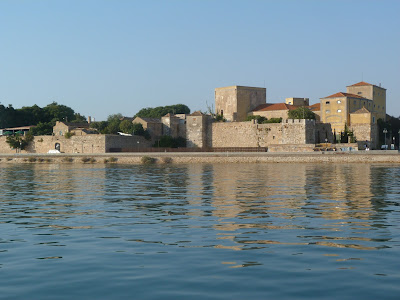Come inside...a short glimpse inside 300 Days of Sun. I always enjoy reading and researching into a fascinating subject, and with this novel I loved writing the sections of the novel set in wartime Lisbon. Here's one of the early scene-setters, viewed through the eyes of Alva Barton, wife of an American newspaperman. The Bartons have left Rome, then Paris as the German army of occupation swept into France in 1940. After a nerve-jangling journey south, they have arrived in Portugal's capital city, along with many other refugees desperate to escape Europe.
The attic room at the Hotel Métropole was stuffy and a long way from the bathroom. But the Bartons were used to being thrown back on their own resources. Wasn’t that how they had ended up here? They were still the people they were before they lay on these hard twin beds, getting up each morning to eat salty toasted cheese sandwiches for breakfast and lobsters and langoustines for lunch, considered not extravagant but very standard local fare. Scrupulous cleanliness was the norm and they were treated with warmth and cordiality by the Portuguese at the hotel, in the cafés, in the shops.
Like Rome, Lisbon was a city on seven hills. After it was destroyed by the great earthquake of 1755, the architecture that rose from the ruins was bold and uniform in style, the best the eighteenth century could offer. Set back from the Tagus waterfront behind a wide square with a horseman statue was a triumphal arch with colonnaded building forming wings to either side, reminiscent of the Rue de Rivoli in Paris. In its way, the city was as self-confident and beguiling as Paris. It even had its Champs Elysée: the magnificent tree-lined Avenida de la Liberdade.
On display in the stores of the Rua Augusta was an abundance of goods and food, much of it imported: McVitie’s biscuits from England, Haig whisky from Scotland, German stollen cakes made with marzipan. Newspapers with all the familiar titles, the Daily Mail from London, the Herald and France Soir from Paris, the Deutsche Allgemeine Zeitung, squashed together into the racks in similar proportion to the displaced persons in the cafés. The British Embassy was next to the building that housed the German Legation, which left the Union Jack fluttering with authority only a few hundred yards from the Nazi swastika.
At night, Lisbon possessed a rare beauty. Light danced from shops and houses; churches and palaces were floodlit like stage sets. The streets were full with a sense of happiness until three in the morning. The clubs oozed American dance music. It was all too possible to mistake it for a safe haven, a place of excitement and adventure. When they heard gunfire as they walked through a side street, on the second night, they cowered against a wall but no advance troops appeared. The next day they were told that what they had most likely heard was the beating of carpets. A local law forbade the practice between the hours of nine a.m. and midnight, so those householders who abhorred early rising beat their carpets in the party hours.
300 Days of Sun is available through all good bookshops and on Amazon - link here.
From HarperCollins US catalog: "Deborah Lawrenson’s mesmerizing novel transports readers to a sunny Portuguese town with a shadowy past—where two women, decades apart, are drawn into a dark game of truth and lies that still haunts the shifting sea marshes.
Traveling to Faro, Portugal, journalist Joanna Millard hopes to escape an unsatisfying relationship and a stalled career. Faro is an enchanting town, and the seaside views are enhanced by the company of Nathan Emberlin, a charismatic younger man. But beneath the crumbling façade of Moorish buildings, Joanna soon realizes, Faro has a seedy underbelly, its economy compromised by corruption and wartime spoils. And Nathan has an ulterior motive for seeking her company: he is determined to discover the truth involving a child’s kidnapping that may have taken place on this dramatic coastline over two decades ago.
Joanna’s subsequent search leads her to Ian Rylands, an English expat who cryptically insists she will find answers in The Alliance, a novel written by American Esta Hartford. The book recounts an American couple’s experience in Portugal during World War II, and their entanglements both personal and professional with their German enemies. Only Rylands insists the book isn’t fiction, and as Joanna reads deeper into The Alliance, she begins to suspect that Esta Hartford’s story and Nathan Emberlin’s may indeed converge in Faro -- where the past not only casts a long shadow but still exerts a very present danger."
For a great review in Portugalist, the must-read travel site for Portugal, click here.










